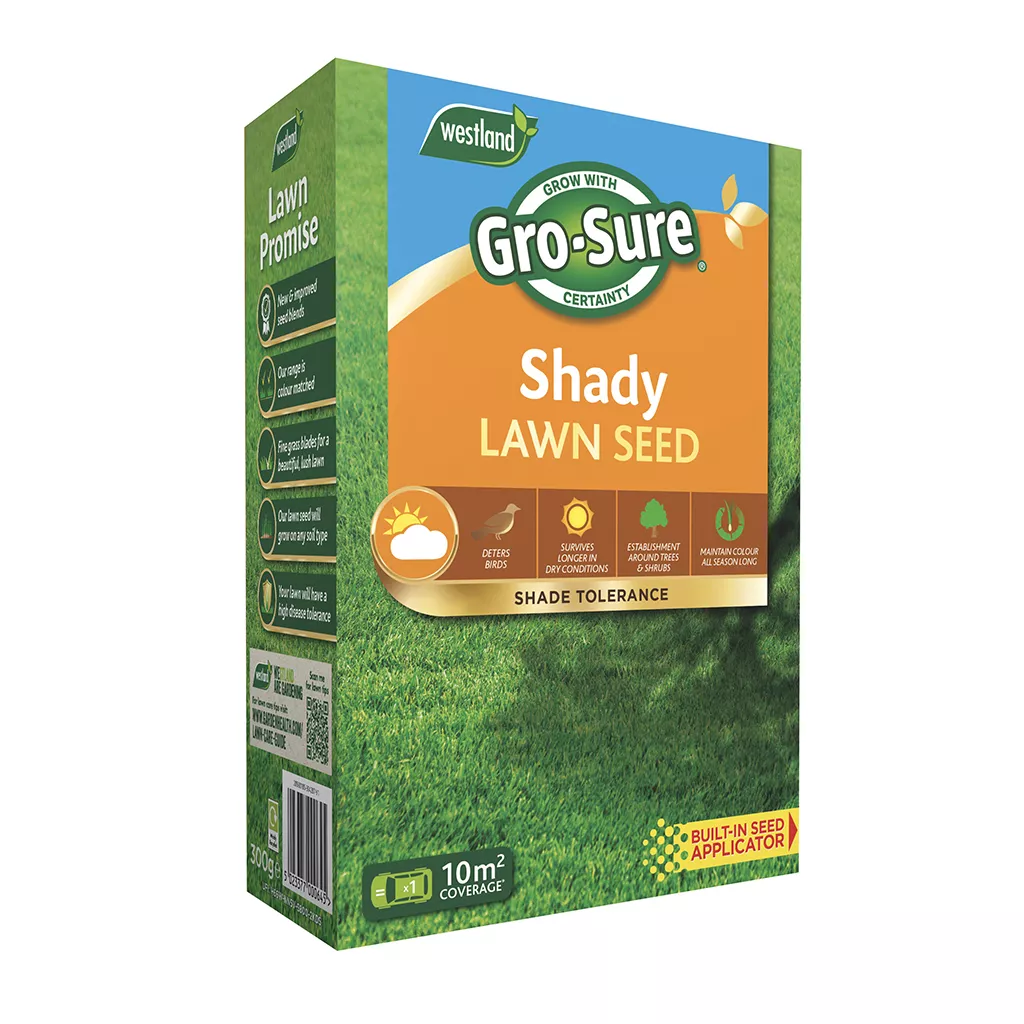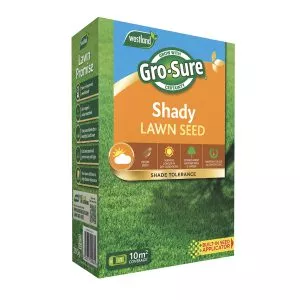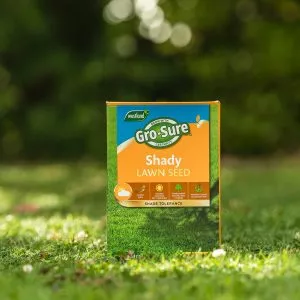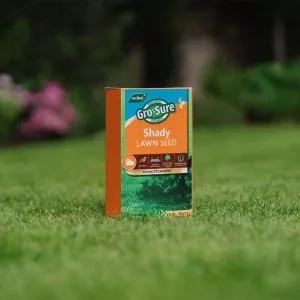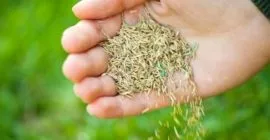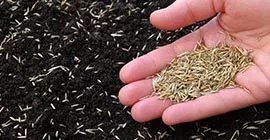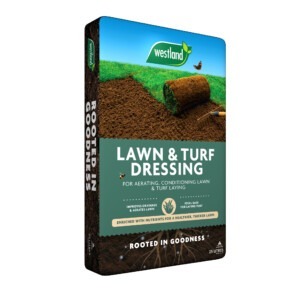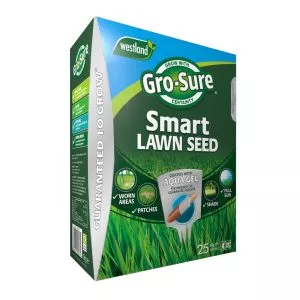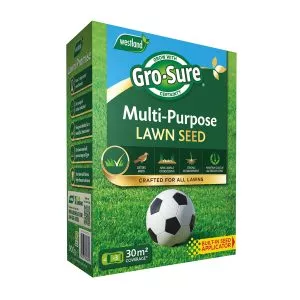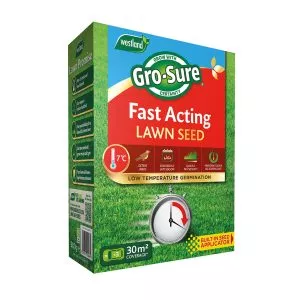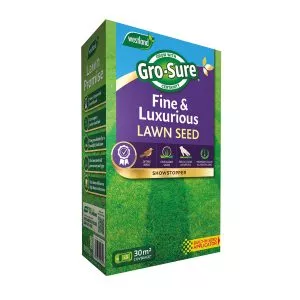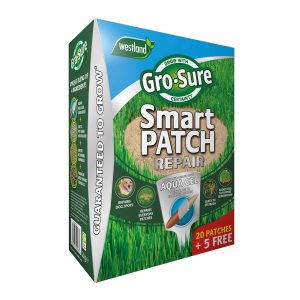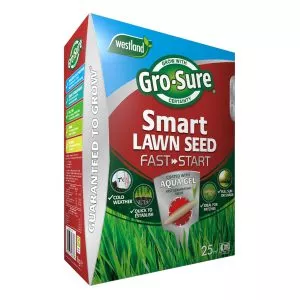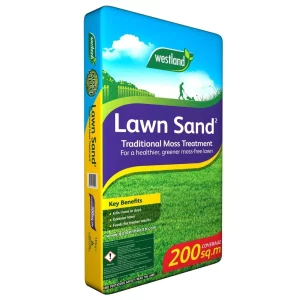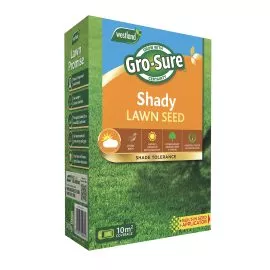This Gro-Sure Shady Lawn Seed is a blend of seed varieties specially selected for their tolerance to shady and drought affected areas. Ideal for starting a new lawn, over-seeding worn grass or also filling in bare patches. The 10m2 box features a built in seed applicator too This gives you greater accuracy as well as an even distribution across the area.
- Grass seed germinates in shady areas
- Perfect for around buildings, trees and also bushes
- Ideal in drier conditions
- Maintains colour all season long
- Seed treatment to help deter birds from feeding
Sizes available
- 10m2 box
- Product Details
- How to Use
- Overseeding
- Tips & Advice
Why Use
Gro-Sure® Shady Lawn Seed is treated to significantly improve germination and for quicker establishment.
- New and improved seed blends
- Our range is colour matched
- Fine grass blades for a beautiful, lush lawn
- Our lawn seed will grow on any soil type
- Your lawn will have a high disease tolerance
What to Expect
In good conditions blades of grass can usually be seen in under 2 weeks, however if the conditions are unfavourable this may take considerably longer.
When to Use
Lawn seed may be sown from March to October. Ideally sow during March to May or September to October
Where to Use
Existing lawns -to overseed
Bare soil – to establish new lawns
Patches – for repairs
Shade – around trees and shrubs
How to Use
Best Conditions: Lawn seed grows best when the soil temperature is consistently around 10—18°C. If conditions stray out of this range, time and rate of germination can be negatively impacted
Sowing a New Lawn
1. Prepare the soil by clearing away any debris and weeds
2. Dig over the soil, breaking down any lumps and tread the soil to firm it again. Level with a rake
3. Shake the box to mix up the seeds. Sprinkle in 2 passes at right angles to each other at rate of 30g/sq. m
4. Lightly rake into the surface
5. Spread Gro-Sure Lawn Seeding Soil over the surface to a 3-4cm depth and level out.
How to Thicken an Existing Lawn
1. Remove any weeds. Mow the lawn closely. If the ground is compacted aerate using a garden fork
2. Spread Westland Lawn and Turf Dressing to fill any shallow holes and to level-out the surface
3. Shake the box to mix up the seeds. Sprinkle in 2 passes at right angles to each other at rate of 25g/sq. m
4. Lightly rake into the surface
After Sowing
Lightly firm the ground by walking over it or use a roller. This will press the seed into the soil. Water thoroughly. Use a fine-rose watering can or sprinkler. Take care not to wash the seeds away. Water daily until established. In very hot conditions water late in the day once the sun has gone down. It’s better to water thoroughly once rather than several times lightly. Mow for the first time when grass is 5-8cm high. Gradually lower the cutting height to about 2.5cm. After 8 weeks we recommend feeding with Aftercut Ultra Green Plus Lawn Feed.
The overseeding of your existing lawn is an essential part of your annual lawn maintenance. All lawns are affected by the specific growing environment. This includes their level of use and general weather conditions. As a result of these conditions, its key to understand the basic principles of overseeding. Its also important to choose the right seed mix to achieve a greener and healthier lawn.
Overseeding achieves:
- To infill damaged, bare or thin patches, as well as worn areas to achieve a greater thickness
- All of our lawn seed is pantone matched. So it does not matter if you have used a previous seed product. The colour will be the same – overseeding will improve the colour of the lawn overall
- Reduce weeds and moss
When should I overseed my lawn:
The best time to do this is either in spring or autumn or both. Germination can take between 7 and 21 days so you will require the ideal conditions these seasons will bring.
Choosing the right seed:
- For shady and dry areas try our Gro-Sure Lawn Seed Shady & Dry
- For areas where your grass never seems to grow try our Gro-Sure Smart Lawn Seed
- If you need to germinate seeds quickly and in colder conditions try Gro-Sure Smart Lawn Seed Fast Start
- Our general lawn seed for all lawns is Gro-Sure Multi-Purpose Lawn Seed
- To achieve fast results use Gro-Sure Fast Acting Lawn Seed
- Areas of your lawn with lots of traffic try Gro-Sure Hardwearing Lawn Seed
- For a showstopper lawn try our Gro-Sure Fine & Luxurious Lawn Seed
How to overseed your lawn
- Mow your lawn to approx 25mm.
- Use a spring tine rake to break up and remove the layer of dead matted grass (thatch). If the depth opf the thatch is quite dense use a scaryfing rake, as this will ensure the seed make contact with the soil allowing it to germinate
- Using a garden fork or aerator to spike the lawn at 300mm intervals
- If your lawn has not been fed in the last 4 months we recommend feeding the lawn before overseeding. Your lawn can then be overseeded 3 to 4 days after applying lawn fertiliser. However, please note you will usually need to wait about 4 weeks after applying a feed, weed & moss killer. (Check the instructions on the product for this.)
- Sow the seed evenly across the lawn
- Our range of seed can be mixed with lawn seeding soil and applied to the lawn jointly. This will save a bit of time and effort working the topdressing and seed into the surface
- The seeded area must now be kept moist. Therefore, water your lawn after 2 or 3 days if no rain has fallen.
- Specific bare patches can be reseeded without treating the whole lawn. Apply the same procedure as above
- To protect specific areas from birds consider covering with netting or garden fleece. This should be removed when new shoots start to come through the soil
- Try to keep traffic on your freshly overseeded lawn to a minimum for 7 to 21 days
- Raise mowing heights to approximately 50mm for the initial 2 or 3 cuts, then reduce down to 25mm over the next 2 or 3 cuts
Tips
- 4-5 days before sowing, lightly rake in Westland Growmore
- When preparing to sow, if the soil is dry water it thoroughly the day before and leave to soak in overnight
- The top of the soil should be dry with moist soil just below the surface on the day of sowing
- Store in a cool, dry place and use within the season of purchase
Frequently Asked Questions
Q. Should I cover the seed?
A. The seed should be sown onto and lightly raked in to the soil surface and no deeper than 1-2cm. A germination sheet (or fleece)can be used to speed up the germination stage but should still be removed upon emergence
Q. When can I use a Weed Feed & Moss Killer?
A. Your lawn must be older than a year before using this type of product
Q. Does this contain annual ryegrass?
A. No this mix does not contain any ryegrass, however when ryegrass is used in a blend only perennial ryegrasses that are developed for turf are used.
Q. Can I use this in front of my hedge, where my current grass struggles to grow?
A. Yes this mixture would be quite at home in such an area. But please keep in mind that while it is getting established it will still need plenty of water—the same as all grass seed. Once established it will be able to detail with the harsher conditions
For any questions or advice, please contact our technical advice line on 01480 443789 (Mon-Fri 10am-4pm) or email customerservice@westlandhorticulture.com


